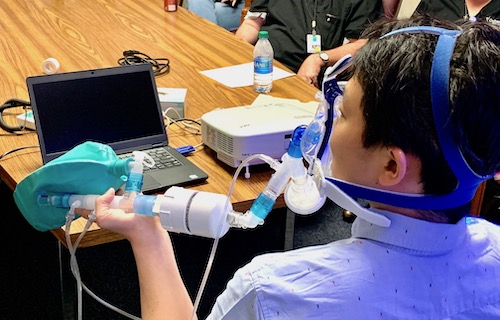A number of research hospitals have begun to use nitric oxide as a therapeutic option for COVID-19. In a recent review, published by George Washington University, researchers suggests that nitric oxide could control the replication and rapid spread of SARS-CoV-2. The GW article is published in the journal Nitric Oxide.
The team, led by first author Nagasai Adusumilli, MBA, a fourth-year medical student at the GW School of Medicine and Health Sciences, reviewed data from between 1993 and 2020 on the pathogenesis of coronaviruses and the use of nitric oxide as a treatment for respiratory illness. The authors highlight the potential for inhaled nitric oxide contributing to better clinical outcomes and alleviating the rapidly rising strain on health care capacity due to COVID-19.
According to experts in the field, “nitric oxide is naturally generated by blood vessels and by some brain cells as well. It helps to regulate blood pressure, engulfs invading toxins, and prevents platelets in the blood from forming clots that may be significantly compromised during times of stress including infection thus warranting the need for a supplemental supply.” Historical use includes newborns with heart defects, emphysema and cystic fibrosis, whereby large blood vessels and tiny capillaries that deliver oxygen constrict. Inhaled nitric oxide is known to relax the vessels, thus increasing the transfer of oxygen to the blood and reducing the heart’s workload.

Other hospitals have also begun to use nitric oxide and enter into a clinical trial for its use in COVID-19. Louisiana State University Health Shreveport is now one of five sites in the world and the first in Louisiana involved in a clinical trial that assesses inhaled nitric oxide as a treatment for patients with mild to moderate cases of COVID-19. The Nitric Oxide Gas Inhalation Therapy for Mild/Moderate COVID-19 Infection clinical trial at LSU was conceived and sponsored by the Department of Anesthesia and the Respiratory Care Services at the Massachusetts General Hospital, which serves as the coordinating center for this international multicenter trial. In addition to LSU Health Shreveport, other collaborators are the University of Alabama at Birmingham, and academic medical centers in Austria and Sweden.

“I can’t tell you how excited I am to see that inhaled Nitric Oxide is being tested for its effectiveness in patients with COVID-19. Having spent twelve years as a Professor in Louisiana, I am very proud that LSU Health Shreveport is conducting yet another clinical trial involving nitric oxide. I applaud these novel efforts to address this viral pandemic,” said Dr. Louis Ignarro, Nobel Prize Winning Scientist, Discoverer of Nitric Oxide, UCLA Emeritus, Ph.D. in Pharmacology.
Nitric oxide is an antimicrobial and anti-inflammatory molecule with key roles in pulmonary vascular function in the context of viral infections and other pulmonary diseases. In SARS-CoV-1 infection, which led to the outbreak of SARS (severe acute respiratory syndrome) in 2003, nitric oxide inhibited viral replication by cytotoxic reactions through intermediates such as peroxynitrite. It is now one of several potential COVID-19 treatments included in the U.S. Food and Drug Administration’s emergency expanded access program.
“Nitric oxide plays key roles in maintaining normal vascular function and regulating inflammatory cascades that contribute to acute lung injury (ALI) and acute respiratory distress syndrome (ARDS),” said Adam Friedman, MD, interim chair and professor in the Department of Dermatology at the GW School of Medicine and Health Sciences and co-senior author of the review. “Interventions that are protective against ALI and ARDS can play a critical role for patients and health systems during the pandemic.
They explain that the factors that contribute to the inflammatory and immune response include the nitric oxide/reactive oxygen species (NO/ROS) ratio, the activation of M1 macrophages and red blood cell (RBC) damage. “A normal NO/ROS balance is crucial for normal vascular function. NO is an endothelium-derived relaxing factor that plays key roles in vascular signaling, regulation of blood flow and host defense [15]. ROS, such as superoxide, also serve as host defense and are induced during stress, such as viral infection,” they write.
Friedman’s team says, “because SARS-CoV-2 infects endothelial cells, which are a major source of NO synthesis, the molecule is additionally well-placed to respond to viral attack. As discussed above, NO plays key roles in maintaining normal vascular function and regulating inflammatory cascades that contribute to ALI and ARDS when excessively activated in the context of declining endothelial function.” The article in journal Nitric Oxide also explains the proper use of nitric oxide in clinical settings.
“With the emergence of COVID-19 as a pandemic with the ability to overwhelm the body and our health care infrastructure, patients have a pressing need for effective agents that can slow the disease in their bodies and in their communities,” Friedman said.
As groups continue to publish more results with their respective nitric oxide platforms, the team recommends that dosing and protocol variations should be examined in evaluating the studies. The authors suggest that if nitric oxide’s efficacy is illustrated for COVID-19, its use as a treatment can be pivotal in the fight against the pandemic.
Friedman has been collaborating with co-senior author Joel Friedman, MD, PhD, professor of physiology and biophysics and of medicine at Albert Einstein College of Medicine, on research related to the use of nitric oxide in a broad range of medical indications for close to two decades, and together are developing nitric oxide-based therapeutics for COVID-19.
Conclusion/ The GW study researchers conclude: “While the search for a vaccine and targeted drugs continues, much of medical research is actively exploring the infection’s pathophysiology for points of plausible intervention. An exaggerated immune response and unchecked inflammation are likely at the root of severe illness. Nitric oxide has demonstrated promise in similar respiratory disease models in modulating the prominent inflammation, and the early reported proofs of concept urgently call for randomized control trials in treating COVID-19. Exogenous NO therapy geared toward the right population at the optimal stage of infection may be an accessible, compelling option for patients. If its efficacy is illustrated as therapeutics firms seek its indication for COVID-19, nitric oxide treatment can be pivotal in the world’s fight against this immediate threat to public health.”




